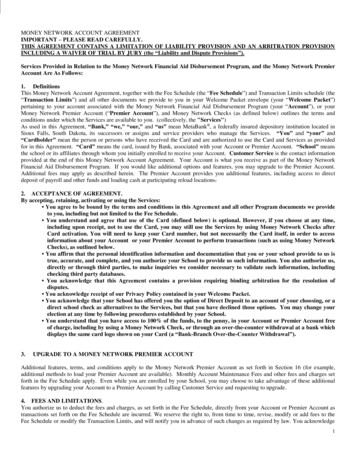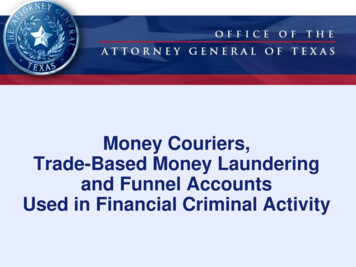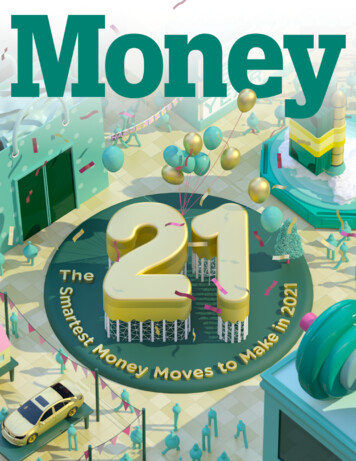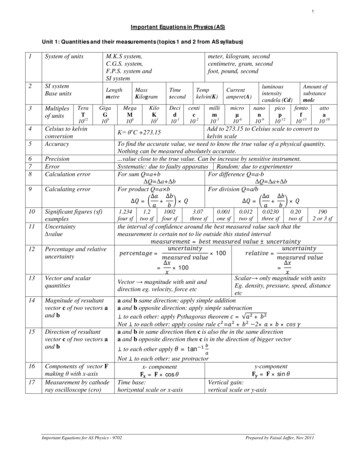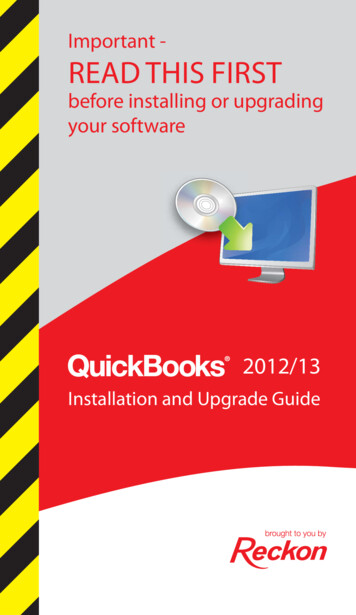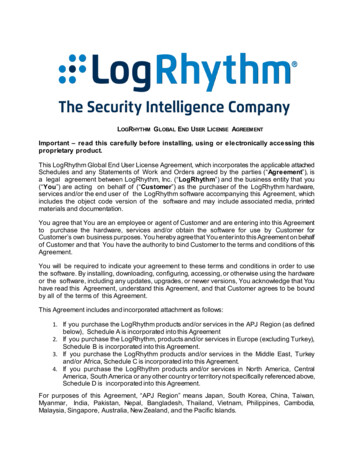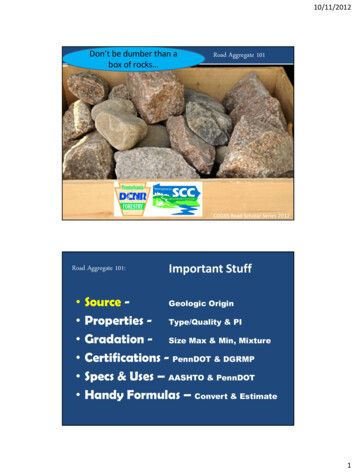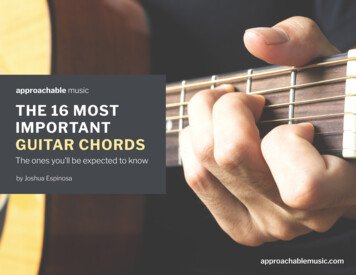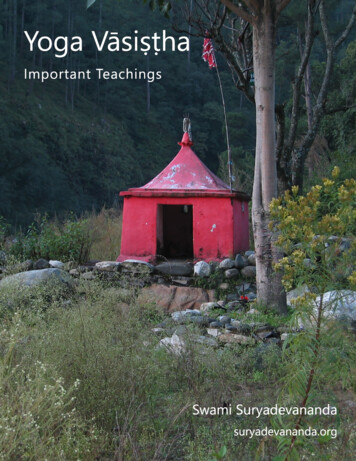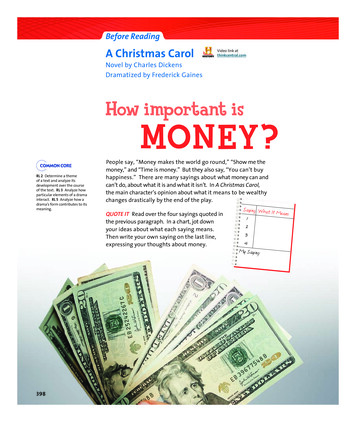
Transcription
Before ReadingA Christmas CarolVideo link atthinkcentral.comNovel by Charles DickensDramatized by Frederick GainesHow important isMONEY?RL 2 Determine a themeof a text and analyze itsdevelopment over the courseof the text. RL 3 Analyze howparticular elements of a dramainteract. RL 5 Analyze how adrama’s form contributes to itsmeaning.People say, “Money makes the world go round,” “Show me themoney,” and “Time is money.” But they also say, “You can’t buyhappiness.” There are many sayings about what money can andcan’t do, about what it is and what it isn’t. In A Christmas Carol,the main character’s opinion about what it means to be wealthychanges drastically by the end of the play.QUOTE IT Read over the four sayings quoted inthe previous paragraph. In a chart, jot downyour ideas about what each saying means.Then write your own saying on the last line,expressing your thoughts about money.Saying WhatIt Means1234My Saying:398398-399 NA L07PE-u03s6-brCaro.indd 3981/8/11 1:07:36 AM
Meet the Authortext analysis: theme in dramaTo identify the theme in a drama, notice the action anddialogue between characters. What characters do and sayprovides clues to the play’s message. Characters’ actions,the setting, and events are often explained in stagedirections, which are set off in parentheses.As you read A Christmas Carol, try to focus not only onwhat the characters say and do but also on how andwhy they say and do those things. Then ask yourself whatmessage the playwright is sharing.reading skill: understand sequence in plotPresenby S t Sp2.wnhoirit2.1.ScroogeASpirits Vi ftersit1.1.2.nowShhownst SPa y SpiritbKnowing the order of events in a work of literature helpsyou better understand the work’s theme. Events arenot always presented in the order in which they happen.The reader may be takenbackward or forward in time.Key EventsIn a drama, clues about thege BScroo eforeorder, or sequence, of eventsts VisitiriSpoften appear in the stage1.1.directions. The titles of the2. 2.scenes also provide cluesabout the sequence of events.As you read A ChristmasCarol, use a sequence wheelto help you keep track of theunusual sequence of events.Possible Futuby Sp reiritvocabulary in contextThe following words all help tell the story of a man whois too concerned with money. How many words can youmatch with their definition?1. accost2. anonymous3. brusque4. currency5. incoherent6. infuriatedCharles Dickens1812–1870Unhappy ChildhoodCharles Dickens’s childhood inEngland provided material for manyof his stories. When Dickens was 12and living with his family in London,his father was put in prison for notpaying his debts. Young Dickens hadto leave school to work in a rat-infestedfactory to help earn money for hisfamily. The hopelessness and shamehe felt there affected him deeply.background to the dramaA Plea for the PoorWhen Frederick Gaines wrote the playyou are about to read, he based it on anovel by the same name that CharlesDickens first published in 1843. At thattime, about one-third of the peoplein London were living in povertyand hunger. The city was dirty andovercrowded, and jobs and houseswere in short supply. Many childrenwere forced to work instead of stayingin school. Charles Dickens wanted hisnovel A Christmas Carol to be “a pleafor the poor.” The book was instantlyand widely popular, and as Dickenshad hoped, it and his other writingsdid affect how his readers felt aboutthe social conditions of their time.a. abrupt or blunt in speakingb. made very angryc. not having one’s name knownd. to approach and speak unpleasantly toe. moneyf. confusedAuthorOnlineGo to thinkcentral.com.ntral.com.KEYWORD: HML7-399ML7-399Complete the activities in your Reader/Writer Notebook.399398-399 NA L07PE-u03s6-brCaro.indd 3991/8/11 1:07:43 AM
Charles Dickensdramatized by Fred GainesCHARACTERSCarolers, Families, DancersFirst BoySecond BoyThird BoyGirl with a dollEbenezer ScroogeBob Cratchit, Scrooge’s clerkFred, Scrooge’s nephewGentleman VisitorWarder and Residentsof the PoorhouseSparsit, Scrooge’s servantCookCharwoman400Jacob MarleyPriestLeperFirst Spirit, the Spiritof Christmas PastJack WaltonBen BenjaminChild ScroogeFan, Scrooge’s sisterFezziwigYoung EbenezerDick WilkinsSweetheart of YoungEbenezerSecond Spirit, the Spiritof Christmas PresentPoorhouse ChildrenMrs. CratchitSeveral Cratchit ChildrenTiny TimBeggar Children, Hungerand IgnoranceThird Spirit, the Spiritof Christmas Yet to ComePeter, a Cratchit childBoyButcherCoachmanunit 3: understanding theme400-424 NA L07PE-u03s6-Carol.indd 4001/8/11 4:38:01 AM
1020The play begins amid a swirl of street life inVictorian London. Happy groups pass; brightlycostumed carolers and families call out to oneanother and sing “Joy to the World.” Three boysand a girl are grouped about a glowing moundof coal. As the carolers leave the stage, the lightsdim and the focus shifts to the mound of coals,bright against the dark. Slowly, the children beginto respond to the warmth. A piano plays softlyas the children talk.First Boy. I saw a horse in a window. ( pause)A dapple . . . gray and white. And a saddle, too. . . red. And a strawberry mane down to here.All new. Golden stirrups. (People pass by thechildren, muttering greetings to one another.)Second Boy. Christmas Eve.Third Boy. Wish we could go.First Boy. So do I.Third Boy. I think I’d like it.First Boy. Oh, wouldn’t I . . . wouldn’t I!Second Boy. We’re going up onto the roof.(The boys look at him quizzically.) My fatherhas a glass. Telescope. A brass one. It opens up3040and it has twists on it and an eyepiece that youput up to look through. We can see all the wayto the park with it.Third Boy. Could I look through it?Second Boy. Maybe . . . where would you look?(The third boy points straight up.) Why there?Third Boy. I’d like to see the moon.(The boys stand and look upward as the girlsings to her doll. One of the boys makes a snowangel on the ground.)Girl (singing).Christ the King came down one day,Into this world of ours,And crying from a manger bed,Began the Christmas hour.(speaking)Christ the King, my pretty one,Sleep softly on my breast,Christ the King, my gentle one,Show us the way to rest.(She begins to sing the first verse again. As snowstarts to fall on the boy making the snow angel, hestands up and reaches out to catch a single flake.)a christmas carol400-424 NA L07PE-u03s6-Carol.indd 4014011/8/11 4:38:10 AM
scrooge in his shop 102030The percussion1 thunders. Scrooge hurls himselfthrough the descending snowflakes and sendsthe children scattering. They retreat, watching.Cratchit comes in. He takes some coal from themound and puts it into a small bucket; as hecarries it to a corner of the stage, the stage areais transformed from street to office. Scrooge’snephew Fred enters, talks with the children,gives them coins, and sends them away witha “Merry Christmas.”Fred. A Merry Christmas, Uncle! God save you!Scrooge. Bah! Humbug!Fred. Christmas a humbug, Uncle? I hope that’smeant as a joke.Scrooge. Well, it’s not. Come, come, what isit you want? Don’t waste all the day, Nephew.Fred. I only want to wish you a MerryChristmas, Uncle. Don’t be cross.Scrooge. What else can I be when I live in sucha world of fools as this? Merry Christmas! Outwith Merry Christmas! What’s Christmas to youbut a time for paying bills without money, atime for finding yourself a year older and not anhour richer. If I could work my will, every idiotwho goes about with “Merry Christmas” on hislips should be boiled with his own pudding andburied with a stake of holly through his heart.Fred. Uncle!Scrooge. Nephew, keep Christmas in your ownway and let me keep it in mine.Fred. But you don’t keep it.Scrooge. Let me leave it alone then. Much goodmay it do you. Much good it has ever done you.Fred. There are many things from which I405060might have derived good by which I have notprofited, I daresay, Christmas among the rest.And though it has never put a scrap of goldin my pocket, I believe it has done me goodand will do me good, and I say, God bless it!Scrooge. Bah!Fred. Don’t be angry, Uncle. Come! Dine withus tomorrow.Scrooge. I’ll dine alone, thank you.Fred. But why?Scrooge. Why? Why did you get married?Fred. Why, because I fell in love with awonderful girl.Scrooge. And I with solitude. Good afternoon.Fred. Nay, Uncle, but you never came tosee me before I was married. Why give it asa reason for not coming now?Scrooge. Good afternoon.Fred. I am sorry with all my heart to find youso determined; but I have made the attempt inhomage to Christmas, and I’ll keep that goodspirit to the last. So, a Merry Christmas, Uncle.Scrooge. Good afternoon!Fred. And a Happy New Year!Scrooge. Good afternoon! (Fred hesitates asif to say something more. He sees that Scroogehas gone to get a volume down from the shelf,and so he starts to leave. As he leaves, thedoorbell rings.) Bells. Is it necessary to alwayshave bells? (The gentleman visitor enters,causing the doorbell to ring again.) Cratchit!Cratchit. Yes, sir?Scrooge. The bell, fool! See to it!Cratchit. Yes, sir. (He goes to the entrance.)1. percussion: noise made by loudly striking objects, such as drums or cymbals.402unit 3: understanding theme400-424 NA L07PE-u03s6-Carol.indd 402All photographs from the 2003 performance of A ChristmasCarol, production by Louisiana Tech University School ofthe Performing Arts. Photos Michael Rasbury.1/8/11 4:38:11 AM
a christmas carol400-424 NA L07PE-u03s6-Carol.indd 4034031/8/11 4:38:20 AM
708090100Scrooge (muttering). Merry Christmas . . .Wolves howling and a Merry Christmas . . .Cratchit. It’s for you, sir.Scrooge. Of course it’s for me. You’re notreceiving callers, are you? Show them in.Cratchit. Right this way, sir. (The gentlemanvisitor approaches Scrooge.)Scrooge. Yes, yes?Gentleman Visitor. Scrooge and Marley’s,I believe. Have I the pleasure of addressingMr. Scrooge or Mr. Marley?Scrooge. Marley’s dead. Seven years tonight.What is it you want?Gentleman Visitor. I have no doubt that hisliberality is well represented by his survivingpartner. Here, sir, my card. (He hands Scroogehis business card.)Scrooge. Liberality? No doubt of it? All right,all right, I can read. What is it you want?(He returns to his work.)Gentleman Visitor. At this festive seasonof the year . . .Scrooge. It’s winter and cold. (He continueshis work and ignores the gentleman visitor.)Gentleman Visitor. Yes . . . yes, it is, and themore reason for my visit. At this time of theyear it is more than usually desirable to makesome slight provision for the poor anddestitute2 who suffer greatly from the cold.Many thousands are in want of commonnecessaries; hundreds of thousands are inwant of common comforts, sir.Scrooge. Are there no prisons?Gentleman Visitor. Many, sir.Scrooge. And the workhouse?3 Is it stillin operation?Gentleman Visitor. It is; still, I wish I could110120130140say it was not.Scrooge. The poor law is still in full vigor then?Gentleman Visitor. Yes, sir.Scrooge. I’m glad to hear it. From whatyou said, I was afraid someone had stoppedits operation.Gentleman Visitor. Under the impression thatthey scarcely furnish Christian cheer of mindor body to the multitude, a few of us areendeavoring to raise a fund to buy the poorsome meat and drink and means of warmth.We choose this time because it is the time,of all others, when want is keenly felt andabundance rejoices.4 May I put you down forsomething, sir?Scrooge (retreating into the darkness temporarily).Nothing.Gentleman Visitor. You wish to be anonymous?Scrooge. I wish to be left alone. Since you askme what I wish, sir, that is my answer. I don’tmake merry myself at Christmas, and I can’tafford to make idle people merry. I help supportthe establishments I have mentioned . . . theycost enough . . . and those who are poorly offmust go there.Gentleman Visitor. Many can’t go there, andmany would rather die.Scrooge. If they would rather die, they hadbetter do it and decrease the surplus population.That is not my affair. My business is. It occupiesme constantly. (He talks both to the gentlemanvisitor and to himself while he thumbs through hisbooks.) Ask a man to give up life and means . . .fine thing. What is it, I want to know? Charity?. . . (His nose deep in his books, he vaguely hearsthe dinner bell being rung in the workhouse; he2. destitute: people lacking the necessities of life.3. workhouse: an establishment in which poor people are housed and required to do work.4. abundance rejoices: those with wealth are happy.404unit 3: understanding theme400-424 NA L07PE-u03s6-Carol.indd 4041/8/11 4:38:21 AM
150160170looks up as if he has heard it but never focuses on theactual scene. The warder of the poorhouse stands ina pool of light at the far left, slowly ringing a bell.)Warder. Dinner. All right. Line up. (The poorlyclad, dirty residents of the poorhouse line up andfile by to get their evening dish of gruel,5 wordlesslyaccepting it and going back to eat listlessly in thegloom. Scrooge returns to the business of his office.The procession continues for a moment, then theimage of the poorhouse is obscured by darkness.The dejected gentleman visitor exits.)Scrooge. Latch the door, Cratchit. Firmly, firmly.Draft as cold as Christmas blowing in here.Charity! (Cratchit goes to the door, starts to closeit, then sees the little girl with the doll. She seemsto beckon to him; he moves slowly toward her, andthey dance together for a moment. Scrooge continues to work. Suddenly carolers appear on theplatform, and a few phrases of their carol, “AngelsWe Have Heard on High,” are heard. Scroogelooks up.) Cratchit! (As soon as Scrooge shouts,the girl and the carolers vanish and Cratchitbegins to close up the shop.) Cratchit!Cratchit. Yes, sir.Scrooge. Well, to work then!Cratchit. It’s evening, sir.Scrooge. Is it?Cratchit. Christmas evening, sir.Scrooge. Oh, you’ll want all day tomorrow off,I suppose.Cratchit. If it’s quite convenient, sir.Scrooge. It’s not convenient, and it’s not fair. If Iwas to deduct half a crown6 from your salary for it,you’d think yourself ill-used, wouldn’t you? Still youexpect me to pay a day’s wage for a day of no work.Cratchit. It’s only once a year, sir.Scrooge. Be here all the earlier the next morning.Cratchit. I will, sir.180Scrooge. Then off, off.Cratchit. Yes, sir! Merry Christmas, sir!190Scrooge. Bah! (As soon as Cratchit opens the door,the sounds of the street begin, very bright and loud.Cratchit is caught up in a swell of people hurryingthrough the street. Children pull him along to thetop of an ice slide, and he runs and slides down it,disappearing in darkness as the stage suddenly is leftalmost empty. Scrooge goes around the room blowing out the candles, talking to himself.) ChristmasEve. Carolers! Bah! There. Another day. (Heopens his door and peers out.) Black, very black.Now where are they? (The children are heardsinging carols for a moment.) Begging pennies fortheir songs, are they? Oh, boy! Here, boy! (Thelittle girl emerges from the shadows. Scrooge handsher a dark lantern, and she holds it while he lightsit with an ember from the pile of coals.)5. gruel: a thin, watery food made by boiling ground grain in water or milk.6. half a crown: until 1971, an amount of British money equal to one-eighth of a pound. The pound is thebasic unit of British money.a christmas carol400-424 NA L07PE-u03s6-Carol.indd 4054051/8/11 4:38:21 AM
scrooge goes home 102030Scrooge (talking to the little girl). Hold it quiet!Cook (waiting for her Christmas coin). MerryThere. Off now. That’s it. High. Black as pitch.Light the street, that’s it. You’re a bright lad!Good to see that. Earn your supper, boy. You’llnot go hungry this night. Home. You knowthe way, do you? Yes, that’s the way. The houseof Ebenezer Scrooge. (As the two find their wayto Scrooge’s house, the audience sees and hears abrief image of a cathedral interior with aliving crèche7 and a large choir singing “Amen!”;the image ends in a blackout. The lights comeup immediately, and Scrooge is at his door.)Hold the light up, boy, up. (The girl with thelantern disappears.) Where did he go? Boy? Nomatter. There’s a penny saved. Lantern’s goneout. No matter. A candle saved. Yes, here’s thekey. (He turns with the key toward the door, andMarley’s face swims out of the darkness. Scroogewatches, unable to speak. He fumbles for a match,lights the lantern, and swings it toward the figure, which melts away. Pause. Scrooge fits thekey in the lock and turns it as the door suddenlyis opened from the inside by the porter, Sparsit.Scrooge is startled, then recovers.) Sparsit?Sparsit. Yes, sir?Scrooge. Hurry, hurry. The door . . . close it.Sparsit. Did you knock, sir?Scrooge. Knock? What matter? Here, light meup the stairs.Sparsit. Yes, sir. (He leads Scrooge up the stairs.They pass the cook on the way. Scrooge brushes byher, stops, looks back, and she leans toward him.)Cook. Something to warm you, sir? Porridge?Scrooge. Wha . . . ? No. No, nothing.Christmas, sir. (Scrooge ignores the request and thecook disappears. Mumbling, Scrooge follows Sparsit.)Scrooge (looking back after the cook is gone).Fright a man nearly out of his life . . . MerryChristmas . . . bah!Sparsit. Your room, sir.Scrooge. Hmmm? Oh, yes, yes. And goodnight.Sparsit (extending his hand for his coin). MerryChristmas, sir.Scrooge. Yes, yes . . . (He sees the outstretchedhand; he knows what Sparsit wants and isinfuriated.) Out! Out! (He closes the door afterSparsit, turns toward his chamber, and discoversthe charwoman directly behind him.)Charwoman. Warm your bed for you, sir?Scrooge. What? Out! Out!Charwoman. Aye, sir. (She starts for the door.Marley’s voice is heard mumbling somethingunintelligible.)Scrooge. What’s that?Charwoman. Me, sir? Not a thing, sir.Scrooge. Then, good night.Charwoman. Good night. (She exits, andScrooge pantomimes shutting the door behind her.The voice of Marley over an offstage microphonewhispers and reverberates:8 “Merry Christmas,Scrooge!” Silence. Scrooge hears the voice butcannot account for it. He climbs up to open awindow and looks down. A cathedral choir singing“O Come, All Ye Faithful” is heard in the distance.Scrooge listens a moment, shuts the window,4050607. a cathedral interior with a living crèche: the inside of a large church in which real people pose for theChristmas manger scene.8. reverberates (rG-vûrPbE-rAtsQ): echoes.406unit 3: understanding theme400-424 NA L07PE-u03s6-Carol.indd 4061/8/11 4:38:23 AM
400-424 NA L07PE-u03s6-Carol.indd 4071/8/11 4:38:30 AM
708090100and prepares for bed. As soon as he has shut thesound out of his room, figures appear; they seemto be coming down the main aisle of a church,bearing gifts to the living crèche. The orchestraplays “O Come, All Ye Faithful” as the processionfiles out. Scrooge, ready for bed, warms himselfbefore the heap of coals. As he pulls his nightcapfrom a chair, a small hand-bell tumbles off ontothe floor. Startled, he picks it up and rings it forreassurance; an echo answers it. He turns andsees the little girl on the street; she is swinging herdoll, which produces the echo of his bell. Scroogeescapes to his bed; the girl is swallowed up in thedarkness. The bell sounds grow to a din,incoherent as in a dream, then suddenly fallsilent. Scrooge sits up in bed, listens, and hears thechains of Marley coming up the stairs. Scroogereaches for the bell pull to summon Sparsit.The bell responds with a gong, and Marleyappears. He and Scrooge face one another.)Scrooge. What do you want with me?Marley (in a ghostly, unreal voice). Much.Scrooge. Who are you?Marley. Ask who I was.Scrooge. Who were you?Marley. In life, I was your partner, Jacob Marley.Scrooge. He’s dead.Marley. Seven years this night, Ebenezer Scrooge.Scrooge. Why do you come here?Marley. I must. It is commanded me. I mustwander the world and see what I can no longershare, what I would not share when I walkedwhere you do.Scrooge. And must go thus?Marley. The chain? Look at it, Ebenezer, studyit. Locks and vaults and golden coins. I forgedit, each link, each day when I sat in these chairs,110120130140commanded these rooms. Greed, EbenezerScrooge, wealth. Feel them, know them.Yours was as heavy as this I wear seven yearsago, and you have labored to build it since.Scrooge. If you’re here to lecture, I haveno time for it. It is late; the night is cold.I want comfort now.Marley. I have none to give. I know not howyou see me this night. I did not ask it. I havesat invisible beside you many and many aday. I am commanded to bring you a chance,Ebenezer. Heed it!Scrooge. Quickly then, quickly.Marley. You will be haunted by three spirits.Scrooge (scoffing). Is that the chance?Marley. Mark it.Scrooge. I do not choose to.Marley (ominously). Then you will walk whereI do, burdened by your riches, your greed.Scrooge. Spirits mean nothing to me.Marley (slowly leaving). Expect the firsttomorrow, when the bell tolls one, the secondon the next night at the same hour, the thirdupon the next night when the last stroke oftwelve has ended. Look to see me no more.I must wander. Look that, for your own sake,you remember what has passed between us.Scrooge. Jacob . . . Don’t leave me! . . . Jacob!Jacob!Marley. Adieu,9 Ebenezer. (At Marley’s last wordsa funeral procession begins to move across the stage.A boy walks in front; a priest follows, swinginga censer;10 sounds of mourning and the suggestionof church music are heard. Scrooge calls out,“Jacob, don’t leave me!” as if talking in the midstof a bad dream. At the end of the procession is thelittle girl, swinging her doll and singing softly.)9. adieu (E-dyLP): farewell.10. censer: a container in which incense is burned.408unit 3: understanding theme400-424 NA L07PE-u03s6-Carol.indd 4081/8/11 4:38:31 AM
Girl.150Hushabye, don’t you cry,Go to sleep, little baby.When you wake, you shall haveAll the pretty little horses,Blacks and bays, dapples and grays,All the pretty little horses.(She stops singing and looks up at Scrooge; theireyes meet, and she solemnly rings the doll in greeting. Scrooge pulls shut the bed curtains, and thegirl exits. The bell sounds are picked up by the bellsof a leper11 who enters, dragging himself along.)Leper (calling out). Leper! Leper! Stay the way!Leper! Leper! Keep away! (He exits and the clock160begins to chime, ringing the hours. Scrooge sitsup in bed and begins to count the chimes.)Scrooge. Eight . . . nine . . . ten . . . eleven . . .it can’t be . . . twelve. Midnight? No. Not twelve.It can’t be. I haven’t slept the whole day through.Twelve? Yes, yes, twelve noon. (He hurries to thewindow and looks out.) Black. Twelve midnight.( pause) I must get up. A day wasted. I must getdown to the office. (Two small chimes are heard.)Quarter past. But it just rang twelve. Fifteenminutes haven’t gone past, not so quickly.(Again two small chimes are heard.) A quarterto one. The spirit . . . It’s to come at one. (Hehurries to his bed as the chimes ring again.) One.11. leper: a person who has leprosy, a skin disease oncethought to be highly contagious.a christmas carol400-424 NA L07PE-u03s6-Carol.indd 4094091/8/11 4:38:35 AM
the spirit of christmas past 102030The hour is struck again by a large street clock,and the first spirit appears. It is a figure dressedto look like the little girl’s doll.Scrooge. Are you the spirit whose coming wasforetold to me?First Spirit. I am.Scrooge. Who and what are you?First Spirit. I am the Ghost of Christmas Past.Scrooge. Long past?First Spirit. Your past.Scrooge. Why are you here?First Spirit. Your welfare. Rise. Walk with me.Scrooge. I am mortal still. I cannot passthrough air.First Spirit. My hand. (Scrooge grasps the spirit’shand tightly, and the doll’s bell rings softly. Scroogeremembers a scene from his past in which twoboys greet each other in the street.)First Voice. Halloo, Jack!Second Voice. Ben! Merry Christmas, Ben!Scrooge. Jack Walton. Young Jack Walton.Spirits . . . ?First Voice. Have a good holiday, Jack.Scrooge. Yes, yes, I remember him. Bothof them. Little Ben Benjamin. He used to . . .First Voice. See you next term, Jack. Next . . .term . . .Scrooge. They . . . they’re off for the holidaysand going home from school. It’s Christmastime . . . all of the children off home now . . .No . . . no, not all . . . there was one . . .12. Ali Baba: in the Arabian Nights, a poor woodcutter whodiscovers a treasure.13. Robinson Crusoe: a shipwrecked sailor who survives for yearson a small island in the novel Robinson Crusoe.410405060(The spirit motions for Scrooge to turn, andhe sees a young boy playing with a teddy bearand talking to it.) Yes . . . reading . . . poor boy.First Spirit. What, I wonder?Scrooge. Reading? Oh, it was nothing. Fancy,all fancy and make-believe and take-me-away.All of it. Yes, nonsense.Child Scrooge. Ali Baba.12Scrooge. Yes . . . that was it . . .Child Scrooge. Yes, and remember . . . andremember . . . remember Robinson Crusoe?13Scrooge. And the parrot!Child Scrooge. Yes, the parrot! I love him best.Scrooge (imitating the parrot). With his stripy greenbody and yellow tail drooping along and couldn’tsing—awk—but could talk, and a thing like alettuce growing out the top of his head . . . andhe used to sit on the very top of the tree—up there.Child Scrooge. And Robinson Crusoe sailedaround the island, and he thought he hadescaped the island, and the parrot said, theparrot said . . .Scrooge (imitating the parrot). RobinsonCrusoe, where you been? Awk! RobinsonCrusoe, where you been?Child Scrooge. And Robinson Crusoe looked upin the tree and saw the parrot and knew he hadn’tescaped and he was still there, still all alone there.Scrooge. Poor Robinson Crusoe.Child Scrooge (sadly replacing the teddy bear).Poor Robinson Crusoe.Scrooge. Poor child. Poor child.First Spirit. Why poor?Scrooge. Fancy . . . fancy . . . (He tries to mask hisfeelings by being brusque.) It’s his way, a child’sunit 3: understanding theme400-424 NA L07PE-u03s6-Carol.indd 4101/8/11 4:38:35 AM
400-424 NA L07PE-u03s6-Carol.indd 4111/8/11 4:38:44 AM
708090100way to . . . to lose being alone in . . . in dreams,dreams . . . Never matter if they are all nonsense,yes, nonsense. But he’ll be all right, grow outof it. Yes. Yes, he did outgrow it, the nonsense.Became a man and left there, and he became, yes,he became a man and . . . yes, successful . . . rich!(The sadness returns.) Never matter . . . never matter. (Fan runs in and goes to Child Scrooge.) Fan!Fan. Brother, dear brother! (She kisses Child Scrooge.)Child Scrooge. Dear, dear Fan.Fan. I’ve come to bring you home, home forgood and ever. Come with me, come now.(She takes his hand, and they start to run off, butthe spirit stops them and signals for the light onthem to fade. They look at the spirit, aware oftheir role in the spirit’s “education” of Scrooge.)Scrooge. Let me watch them go? Let them be happyfor a moment! (The spirit says nothing. Scrooge turnsaway from them, and the light goes out.) A delicate,delicate child. A breath might have withered her.First Spirit. She died a woman and had, asI remember, children.Scrooge. One child.First Spirit. Your nephew.Scrooge. Yes, yes, Fred, my nephew. (Scroogepauses, then tries to bluster through.) Well? Well,all of us have that, haven’t we? Childhoods?Sadnesses? But we grow and we become men,masters of ourselves. (The spirit gestures for musicto begin. It is heard first as from a great distance,then Scrooge becomes aware of it.) I’ve no timefor it, Spirit. Music and all of your Christmasfolderol.14 Yes, yes, I’ve learnt what you haveto show me. (Fezziwig, Young Ebenezer, andDick appear, busily preparing for a party.)Fezziwig. Yo ho, there! Ebenezer! Dick!Scrooge. Fezziwig! It’s old Fezziwig that110120130I ’prenticed15 under.First Spirit. Your master?Scrooge. Oh, aye, and the best that any boycould have. There’s Dick Wilkins! Bless me.He was very much attached to me was Dick.Poor Dick. Dear, dear.Fezziwig. Yo ho, my boys! No more worktonight. Christmas Eve, Dick! Christmas,Ebenezer! Let’s have the shutters up beforea man can say Jack Robinson! (The musiccontinues. Chandeliers are pulled into position,and mistletoe, holly, and ivy are draped overeverything by bustling servants. Dancers fillthe stage for Fezziwig’s wonderful Christmasparty. In the midst of the dancing and the gaietyservants pass back and forth through the crowdwith huge platters of food. At a pause in the music,Young Ebenezer, who is dancing, calls out.)Young Ebenezer. Mr. Fezziwig, sir, you’rea wonderful master!Scrooge and Young Ebenezer. A wonderful master!Scrooge (echoing the phrase). A wonderfulmaster! (The music changes suddenly, andthe dancers jerk into distorted postures andthen begin to move in slow motion. Thecelebrants slowly exit, performing a macabredance to discordant sounds.16)First Spirit. Just because he gave a party?It was very small.Scrooge. Small!First Spirit. He spent a few pounds of your“mortal” money, three, four at the most.Is that so much that he deserves this praise?Scrooge. But it wasn’t the money. He had thepower to make us happy, to make our servicelight or burdensome. The happiness he gives14. folderol (fJlP-dE-rJlQ): foolishness; nonsense.15. ’prenticed: short for apprenticed, here meaning “learned a trade while working.”16. macabre (mE-käPbrE) dance to discordant sounds: a bizarre, ghastly dance with unharmonious music.412unit 3: understanding theme400-424 NA L07PE-u03s6-Carol.indd 4121/8/11 4:38:46 AM
140150160170is quite as great as if it cost a fortune. That’s what. . . a good master is.First Spirit. Yes?Scrooge. No, no, nothing.First Spirit. Something, I think.Scrooge. I should like to be able to say a wordor two to my clerk just now, that’s all.First Spirit. But this is all past. Your clerk,Cratchit, couldn’t be here.Scrooge. No, no, of course not, an idle thought.Are we done?First Spirit (motioning for the waltz music tobegin). Nearly.Scrooge (hearing the waltz and remembering it). Surelyit’s enough. Haven’t you tormented me enough?(Young
A Christmas Carol Novel by Charles Dickens Dramatized by Frederick Gaines People say, “Money makes the world go round,” “Show me the money,” and “Time is money.” But they also say, “You can’t buy happiness.” There are many sayings about what money can and can’t do, about what it is
